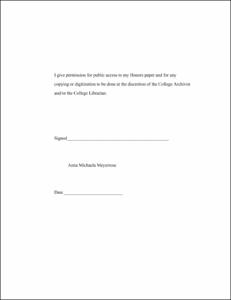Please use this identifier to cite or link to this item:
http://hdl.handle.net/10267/13661Full metadata record
| DC Field | Value | Language |
|---|---|---|
| dc.contributor.author | Meyerrose, Anna Michaela | - |
| dc.date.accessioned | 2012-05-23T17:56:16Z | - |
| dc.date.available | 2012-05-23T17:56:16Z | - |
| dc.date.issued | 2012-05 | - |
| dc.identifier.uri | http://hdl.handle.net/10267/13661 | - |
| dc.description | The author granted permission for the digitization of this paper. It was submitted by CD. | en_US |
| dc.description.abstract | The terrorist attacks of September 11, 2001 placed religiously motivated terrorism at the forefront of western security concerns. In the past decade, however, radical Islamist terrorism has transitioned from a centralized movement with an identifiable leadership to a decentralized one whose existence is dependent on self-radicalization at the local level. Consequently, there have been rising rates of radicalization among primarily second and third generation Muslims living in the West. Due to the continually high threat level of terrorist attacks, it is important for states to understand why certain Muslims living in the West radicalize, a necessary, though not deterministic step on the path toward becoming a terrorist. While this paper does not delve into western foreign policy as a primary cause of radicalization, it does use case studies of the United Kingdom and the United States to compare the prevalence of three proposed possible causes for increased susceptibility to radicalization: identity crises caused by social alienation, feelings of relative deprivation, and a lack of access to political opportunity structures. The research demonstrates that the three variables listed above are more prevalent in the UK than they are in the US, thereby facilitating higher rates of radicalization in the UK than in the US. | en_US |
| dc.description.sponsorship | This honors paper was approved by Drs. Nuray Ibryamova, Stephen Ceccoli, and Yasir Kazi. | en_US |
| dc.publisher | Memphis Tenn. : Rhodes College | en_US |
| dc.rights | Rhodes College owns the rights to the archival digital objects in this collection. Objects are made available for educational use only and may not be used for any non-educational or commercial purpose. Approved educational uses include private research and scholarship, teaching, and student projects. For additional information please contact archives@rhodes.edu. Fees may apply. | - |
| dc.subject | Text | - |
| dc.subject | Honors papers | en_US |
| dc.subject | International Studies, Department of | en_US |
| dc.subject | Student research | en_US |
| dc.title | Possible Causes for the Increased Susceptibility of Radicalization among British and American Muslims | en_US |
| dc.type | Thesis | en_US |
| Appears in Collections: | Honors Papers | |
Files in This Item:
| File | Description | Size | Format | |
|---|---|---|---|---|
| Meyerrose_Anna_Honors_2012.pdf | 379.6 kB | Adobe PDF |  View/Open |
Items in DSpace are protected by copyright, with all rights reserved, unless otherwise indicated.